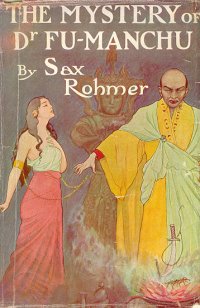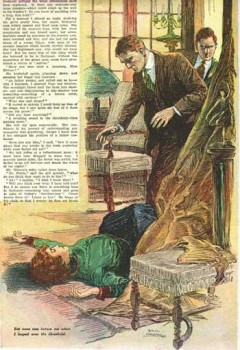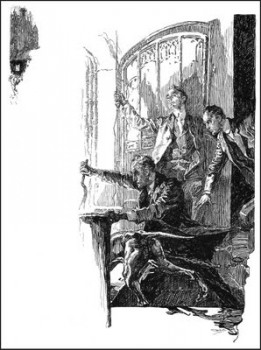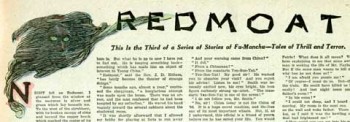Blogging Sax Rohmer’s The Insidious Doctor Fu Manchu, Part Four – “Redmoat”
NOTE: The following article was first published on April 4, 2010. Thank you to John O’Neill for agreeing to reprint these early articles, so they are archived at Black Gate which has been my home for over 5 years and 260 articles now. Thank you to Deuce Richardson without whom I never would have found my way. Minor editorial changes have been made in some cases to the original text.

 “Redmoat” was the third installment of Sax Rohmer’s serial Fu-Manchu, first published in The Story-Teller in December 1912. The story would later comprise Chapters 7-9 of the novel, The Mystery of Dr. Fu-Manchu (initially re-titled The Insidious Dr. Fu-Manchu for U.S. publication) in 1913. “Redmoat” is significant for delving into the aftermath of the Boxer Uprising. As we discussed in Part Three, this conflict leant credence to the Yellow Peril fiction that had been steadily gaining in popularity over the preceding fifty years. More importantly for our purpose, the Boxer Uprising provided a motive for Dr. Fu-Manchu’s actions.
“Redmoat” was the third installment of Sax Rohmer’s serial Fu-Manchu, first published in The Story-Teller in December 1912. The story would later comprise Chapters 7-9 of the novel, The Mystery of Dr. Fu-Manchu (initially re-titled The Insidious Dr. Fu-Manchu for U.S. publication) in 1913. “Redmoat” is significant for delving into the aftermath of the Boxer Uprising. As we discussed in Part Three, this conflict leant credence to the Yellow Peril fiction that had been steadily gaining in popularity over the preceding fifty years. More importantly for our purpose, the Boxer Uprising provided a motive for Dr. Fu-Manchu’s actions.
There are two principal supporting players to the story who are worthy of greater consideration. The first is the Reverend J. D. Eltham. Reverend Eltham had earned a name for himself during his missionary days in China as “Parson Dan.” Nayland Smith tells Dr. Petrie that Eltham “held off two hundred Boxers at a hospital in Nan-Yang with only a garrison of a dozen cripples and a German doctor for support.” The heroic clergyman’s evangelical zeal had resulted, according to Smith, in the Boxer Uprising. While ascribing the blame for that conflict on a single missionary is more than a bit implausible, it is interesting that Rohmer, an Edwardian author, took a critical view of the British Empire and recognized that intolerance to Chinese culture not only hindered the goal of religious conversion, but sparked China’s decision to drive the foreigners out of their country by whatever means necessary. It is also interesting to note that as Fu-Manchu is the personification of the Yellow Peril, so Parson Dan is the personification of colonial intolerance at its worst.
The other supporting character of import is Eltham’s daughter, Greba. It has long been a convention of pulp fiction that supporting players who do not fit the mold of the virile hero instead play the part of the absentminded scientist or the irascible elder statesman. These characters are usually brilliant, but require the hero to defend or rescue them. Such characters are usually widowers or confirmed bachelors whose all-consuming passion is their vocation. They frequently have nubile daughters, granddaughters, or nieces in tow to soften them and play damsel in distress and, ultimately, serve as the reward for the hero upon completion of his trials. Greba Eltham fits this mold in one sense, but in another marks a definite departure for the genre.
 The female supporting player in the first two Fu-Manchu stories (“The Zayat Kiss” and “The Clue of the Pigtail”) was Fu-Manchu’s as yet unnamed slave girl who has twice risked her life to save Petrie from the fate ordained by her master. Greba Eltham takes this role in “Redmoat” and for that purpose must be distinguished from her father. Rohmer accomplishes this by having Petrie note Greba’s classical beauty upon her first appearance in the story. There is no greater compliment paid in Rohmer’s fictional universe than having one’s likeness compared to a noble personage. Nayland Smith describes Fu-Manchu, the object of his obsession, as having a “brow like Shakespeare and a face like Satan,” so Petrie describes Greba Eltham, the object of his attraction, as resembling “a young Diana” and notes her “clear complexion…sun-kissed arms” and her “round and firm shape.” Additionally, the aligning of Greba Eltham with classical beauty is necessary to delineate the essential difference in her character from her zealous father.
The female supporting player in the first two Fu-Manchu stories (“The Zayat Kiss” and “The Clue of the Pigtail”) was Fu-Manchu’s as yet unnamed slave girl who has twice risked her life to save Petrie from the fate ordained by her master. Greba Eltham takes this role in “Redmoat” and for that purpose must be distinguished from her father. Rohmer accomplishes this by having Petrie note Greba’s classical beauty upon her first appearance in the story. There is no greater compliment paid in Rohmer’s fictional universe than having one’s likeness compared to a noble personage. Nayland Smith describes Fu-Manchu, the object of his obsession, as having a “brow like Shakespeare and a face like Satan,” so Petrie describes Greba Eltham, the object of his attraction, as resembling “a young Diana” and notes her “clear complexion…sun-kissed arms” and her “round and firm shape.” Additionally, the aligning of Greba Eltham with classical beauty is necessary to delineate the essential difference in her character from her zealous father.
Reverend Eltham’s estate, Redmoat is tellingly a former Roman outpost on British soil. Greba’s father has fortified the estate with an elaborate security system after having previously transformed its drained moat into a garden. The typical Edwardian as represented by Reverend Eltham has little appreciation for the beauty of the past. This is what separates Smith and Petrie from their fellow men and binds them as friends. It is the quality that enables them to appreciate the uncorrupted beauty of the East. They are, like their creator, men out of time. Old souls trapped in the twentieth century but wishing for a simpler world more suited to their temperaments.
 Reverend Eltham makes, as Smith wryly notes, a poor evangelist. He does not understand human nature. He lacks an appreciation of foreign cultures as much as his own nation’s history. Men like Eltham can only destroy for they lack the sensitivity and empathy to preserve or respect that which exists outside their limited scope. Interestingly, Eltham is a hero in the eyes of the British Empire and yet, he is hardly portrayed as a sympathetic character. Petrie is surprised when he learns of Eltham’s role in the Boxer Uprising for he viewed the clergyman as soft-spoken and meek, yet Petrie will come to detect a fire in Eltham’s eyes at odd moments. Eltham is a man with a storied past far removed from the respectability a Man of God was expected to command at the turn of the last century.
Reverend Eltham makes, as Smith wryly notes, a poor evangelist. He does not understand human nature. He lacks an appreciation of foreign cultures as much as his own nation’s history. Men like Eltham can only destroy for they lack the sensitivity and empathy to preserve or respect that which exists outside their limited scope. Interestingly, Eltham is a hero in the eyes of the British Empire and yet, he is hardly portrayed as a sympathetic character. Petrie is surprised when he learns of Eltham’s role in the Boxer Uprising for he viewed the clergyman as soft-spoken and meek, yet Petrie will come to detect a fire in Eltham’s eyes at odd moments. Eltham is a man with a storied past far removed from the respectability a Man of God was expected to command at the turn of the last century.
The fact that Eltham survives his encounter with Dr. Fu-Manchu is only because he agrees to abandon his plans to return to China. Once again, Dr. Fu-Manchu acts with honor and shows himself as the moral superior to the imperialist British heroes. Fu-Manchu, like Smith and Petrie, is able to reconcile the Old World with the New. More importantly, like China during the Boxer Uprising – Dr. Fu-Manchu wants only to remove the threat to his nation, not overrun the West. The strength of the Yellow Peril myth is it appeals to fear rather than fact. It is Reverend Eltham who most clearly represents the proponents of the Yellow Peril even more than the colonialist Nayland Smith for it is Eltham who lacks the empathy that is essential to bridging cultures. It is ironic that Sax Rohmer’s Fu-Manchu stories, long-derided as racist and jingoistic, actually represent a more enlightened view of the East. Beneath the exotic mystery and thrills, their author repeatedly demonstrates that the differences between East and West are reconcilable.
William Patrick Maynard was licensed by the Sax Rohmer Literary Estate to continue the Fu Manchu thrillers beginning with The Terror of Fu Manchu(2009; Black Coat Press) and The Destiny of Fu Manchu (2012; Black Coat Press). The Triumph of Fu Manchu is coming soon from Black Coat Press.
>>> It is ironic that Sax Rohmer’s Fu-Manchu stories, long-derided as racist and jingoistic,
That is the real sad irony of modern “Social Justic Warrior”, formerly P.C. whine about classic “Pulp” fiction; that it was racist, sexist, etc.
Most stories, most writers, were actually forward thinking for their times. Some were mildly progressive who simply weren’t far enough for today’s crazed standards, others might have innocently used cliches (Yellow Fu Manchu clones, Filed Teeth Jungle cannibals) not meaning malice. They were rarely “P.C.” and even those forward thinking wouldn’t meet today’s reactionary fake standards, but were not often as racist and reactionary as the times they wrote it. But the times they were written in, so openly racist and sexist, but now forgotten the contrast is no longer there.
A good example is “Buck Rogers”, rather the classic original stories, “Armageddon 2419 A.D.” and “Airlords of the Han”. Yes, they used the “Yellow Peril” trope though Nowland retconned it a bit at the end of the 2nd novel after talking to a lot of Chinamen personally and risked wrecking his popular story to change it a bit – but then again it had women in jobs equal to men, going into battle with them, etc.
I remember one thing on Fu Manchu, I think it was in a movie as a child, but with Fu Manchu plotting a bacterial warfare agenda. The heroes confront him, asking what kind of evil he could be to even think of it, he pulls out an ancient penny dreadful era publication with Jack London’s “The Unparralelled Invasion”! And it wasn’t spelled out either, left it for people to look it up if they didn’t know it.
So – I’m interested in the term “Liscenced” by the estate!? Thought Fu Manchu was beyond beyond in the Public Domain? He’s even older than Sherlock holmes… I mean, sure a new writer couldn’t have him talking with Shang-Chi his estranged son without working with Marvel, or refs to the more recent movies, but really…